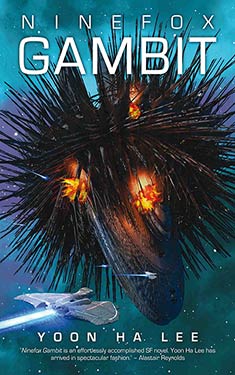Yoon Ha Lee
Completed 6/25/2017, reviewed 7/1/2017
2 stars
This is another Hugo nominee. For some reason, I decided to read all the
Hugo nominees this year before the award was given out. Out of all the nominees I’ve read so far,
this is my second least favorite, after Too Like the Lightning. It’s military s.f. with a very complex
universe based on mathematics. Despite
having been a math major (over 30 years ago) I missed the whole point of the mathematics. The book was that complex. I didn’t enjoy it, but I still recognize that
the book was pretty well designed.
 Kel Cheris is a captain who is given a chance to redeem
herself after misconduct on the battlefield.
She’s assigned to capture a fortress that’s been commandeered by
heretics. To accomplish this she brings
back the consciousness of a general Jedao who is one of the greatest generals
in history, but also a madman who caused the death of over a million people
including his own soldiers. Can Cheris
take back the fortress without becoming Jedao’s next victim?
Kel Cheris is a captain who is given a chance to redeem
herself after misconduct on the battlefield.
She’s assigned to capture a fortress that’s been commandeered by
heretics. To accomplish this she brings
back the consciousness of a general Jedao who is one of the greatest generals
in history, but also a madman who caused the death of over a million people
including his own soldiers. Can Cheris
take back the fortress without becoming Jedao’s next victim?
The world building in this book is pretty phenomenal. It is based on mathematics, as I mentioned
above, and everything has its place and structure, right down to the
calendar. If a heresy arises and
something like a day is added to the week, it threatens to warp reality, even
to the point of causing weapons to malfunction.
The heretics who took over the fortress have a calendrical heresy that
must be put down. Cheris and Jedao are
the ones to do it.
As much as the world building is impressive, it was also
very frustrating for me. The book plops
you down in the middle of the universe, using the concepts and jargon without
being introduced to it. You have to
divine it yourself. I never did. I never really grasped the whole calendrical
heresy concept, leaving me lost in this relatively short book. I would have occasional moments of clarity,
only to be lost a few paragraphs later. It made the reading of the book a wholly unpleasant
experience.
At the same time, I recognize that the book is well formulated. I won’t say well written, because I believe
that if it was, I would have understood it better. But throughout the book, I was impressed by
the author’s word choices. He used a lot
of strong nouns and verbs, making for striking, but inevitably difficult
prose. By the end, I was simply looking
at words, not fully grasping what I was reading.
I give the book two stars out of five. I think this book is for people who like complex
space opera, and who don’t mind waiting a whole book to figure out most of what’s
going on. There’s a part of me that
wanted to give this book three stars, acknowledging that it’s an intelligent
book, but my own personal experience with it was simply too miserable.
No comments:
Post a Comment